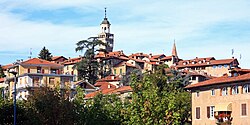Marquis of Saluzzo
| Saluzzo | |
|---|---|
| Comune | |
| Città di Saluzzo | |
 |
|
| Location of Saluzzo in Italy | |
| Coordinates: 44°39′N 07°29′E / 44.650°N 7.483°ECoordinates: 44°39′N 07°29′E / 44.650°N 7.483°E | |
| Country | Italy |
| Region | Piedmont |
| Province / Metropolitan city | Cuneo (CN) |
| Government | |
| • Mayor | Paolo Allemano (since June 28, 2004 |
| Area | |
| • Total | 75 km2 (29 sq mi) |
| Elevation | 395 m (1,296 ft) |
| Population (july 31, 2011) | |
| • Total | 17,183 |
| • Density | 230/km2 (590/sq mi) |
| Demonym(s) | Saluzzesi |
| Time zone | CET (UTC+1) |
| • Summer (DST) | CEST (UTC+2) |
| Postal code | 12037 |
| Dialing code | 0175 |
| Patron saint | St. Chiaffredo |
| Saint day | The Monday after the First September's Sunday |
| Website | Official website |
Saluzzo (Italian pronunciation: [saˈluttso]; French: Saluces [salys]) is a town and former principality in the province of Cuneo, Piedmont region, Italy.
The city of Saluzzo is built on a hill overlooking a vast, well-cultivated plain. Iron, lead, silver, marble, slate etc. are found in the surrounding mountains. It has a population of approximately 17,000.
Saluzzo was the birthplace of the writer Silvio Pellico and of typographer Giambattista Bodoni.
Saluzzo (Salusse in Piemontese, Saluces in French) was a civitas (tribal city state) of the Vagienni, or mountain Ligures, and later of the Salluvii. This district was brought under Roman control by the Consul Marcus Fulvius circa 125BC.
In the Carolingian age it became the residence of a count; later, having passed to the Marquesses of Susa, Manfred I, son of Marquess Bonifacio del Vasto, on the division of that principality became Marquess of Saluzzo; this family held the marquisate of Saluzzo from 1142 to 1548. The marquisate embraced the territory lying between the Alps, the Po and the Stura, and was extended on several occasions. In the Middle Ages it had a chequered existence, often being in conflict with powerful neighbours, chiefly the Counts (later Dukes) of Savoy. After Manfred II's death, his widow had to accept a series of tributes, which were to be later the base of the House of Savoy's claims over the increasingly feebler marquises' territories. Thomas III, a vassal of France, wrote the romance Le chevalier errant ('the knight-errant').
...
Wikipedia

